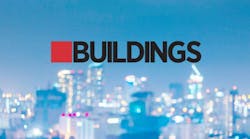The first updates to LEED v4, LEED v4.1 for Building Operations and Maintenance (O+M), have been released in beta. Focused on existing buildings, the updates will track performance in energy, water, waste, transportation, indoor air quality, maintaining a toxin-free environment and occupant satisfaction.
LEED v4.1, first announced at Greenbuild 2017, is the first update in four years to the most widely used and rigorous rating system in the world for green buildings.
“USGBC introduced LEED v4.1 as a series of upgrades that will improve our standards, encourage leadership, and make our platform more user friendly, more accessible and—most importantly—more collaborative than ever before,” explains Melissa Baker, senior vice president of USGBC.
Four goals of the update are to:
1. Address market barriers and lessons learned from LEED v4 project teams.
2. Update performance thresholds and reference standards to ensure LEED remains the global leadership standard for green buildings.
3. Expand the marketplace for LEED.
4. Improve performance throughout the life of buildings, reward leaders based on their performance and incorporate performance reporting to enable building owners to track progress towards environmental, social and governance goals.
The update comes from nine months of review. “We have been out there listening and learning, looking at what works and what doesn’t,” Baker says. “Regions and markets move at different paces, and we want to be sure we can meet the needs of everyone in the green building community.”
BUILDINGS Podcast
LEED Zero: New Designation for Net Zero
Learn more about this designation, including the requirements behind it and how it can benefit your building. Listen now >>
Agile and Continuous Process
This update represents a more agile development process so USGBC is faster to market.
“The feedback has been positive and our community seems eager to test the rating system in the beta and to participate in the evolution of LEED,” Baker says.
USGBC will follow its existing governance and present LEED v4.1 for public comment, followed by a member ballot. Project teams will test the rating system while LEED v4 remains open for use.
[Related: USGBC Opens Call for Proposals for Next Version of LEED]
For LEED v4.1 O+M, USGBC has worked to tell how a building is performing. The rating system is focused on key technical areas such as water, energy, carbon emissions and human health that owners are interested in evaluating and improving.
“It’s critical for owners and managers of large buildings to understand in a concrete way how their buildings are performing and benchmark them against other like buildings or across a portfolio,” Baker says. “This insight allows targeted investments and the use of strategies to lessen the resource use of a building and improve operations.”
Buildings certified under LEED v4 have the option to use tools like the Arc performance platform to enter data and benchmark the buildings in an ongoing, annual review of performance. These buildings have the option to use LEED v4.1 when they’re ready to recertify.
[On topic: Net Zero Over Time Puts Net Zero Energy Buildings Within Reach]
Join the Beta Program
Benefits of a building being LEED certified include:
- Attraction for tenants.
- Possible lower building operating costs.
- Saving of energy and resources.
Registration is open for the LEED v4.1 O+M beta. Each project that joins will have a dedicated person to support it along the way.
“We strongly encourage project teams to join us and participate in the beta to get to know the rating system and provide feedback,” Baker says.
[Read also: How School District Cut 62 Percent in Energy Spending]
While O+M is the first to be updated, other LEED v4.1 rating systems will be released in beta this year.
“The changes made to the rating system simplify and streamline the certification process for projects of all kinds,” Baker says. “We are fully committed to bringing all buildings in as users of LEED, and the launch of LEED v4.1 is a critical step toward realizing our vision of green buildings for all within a generation.”
Two handpicked articles to read next:



